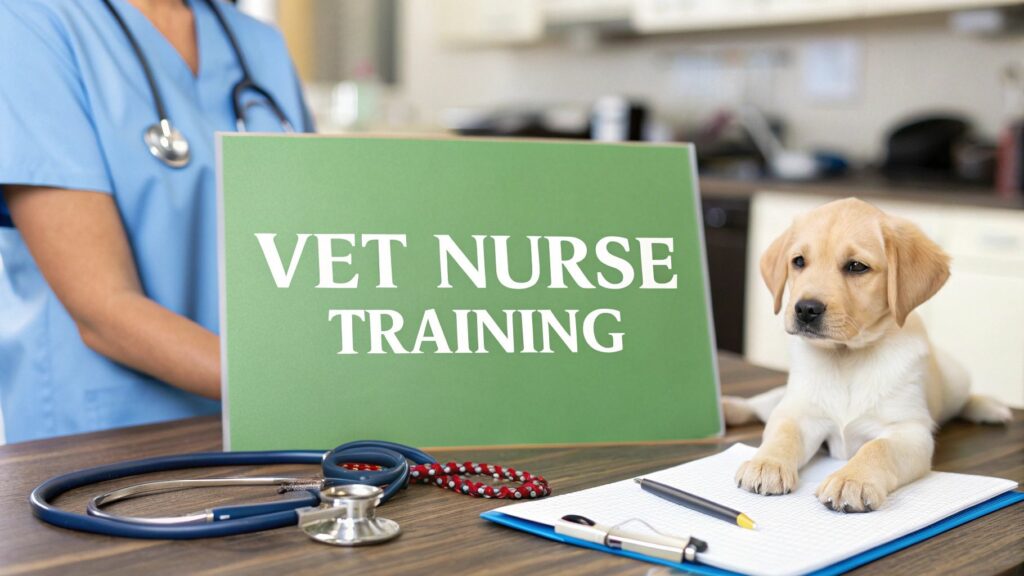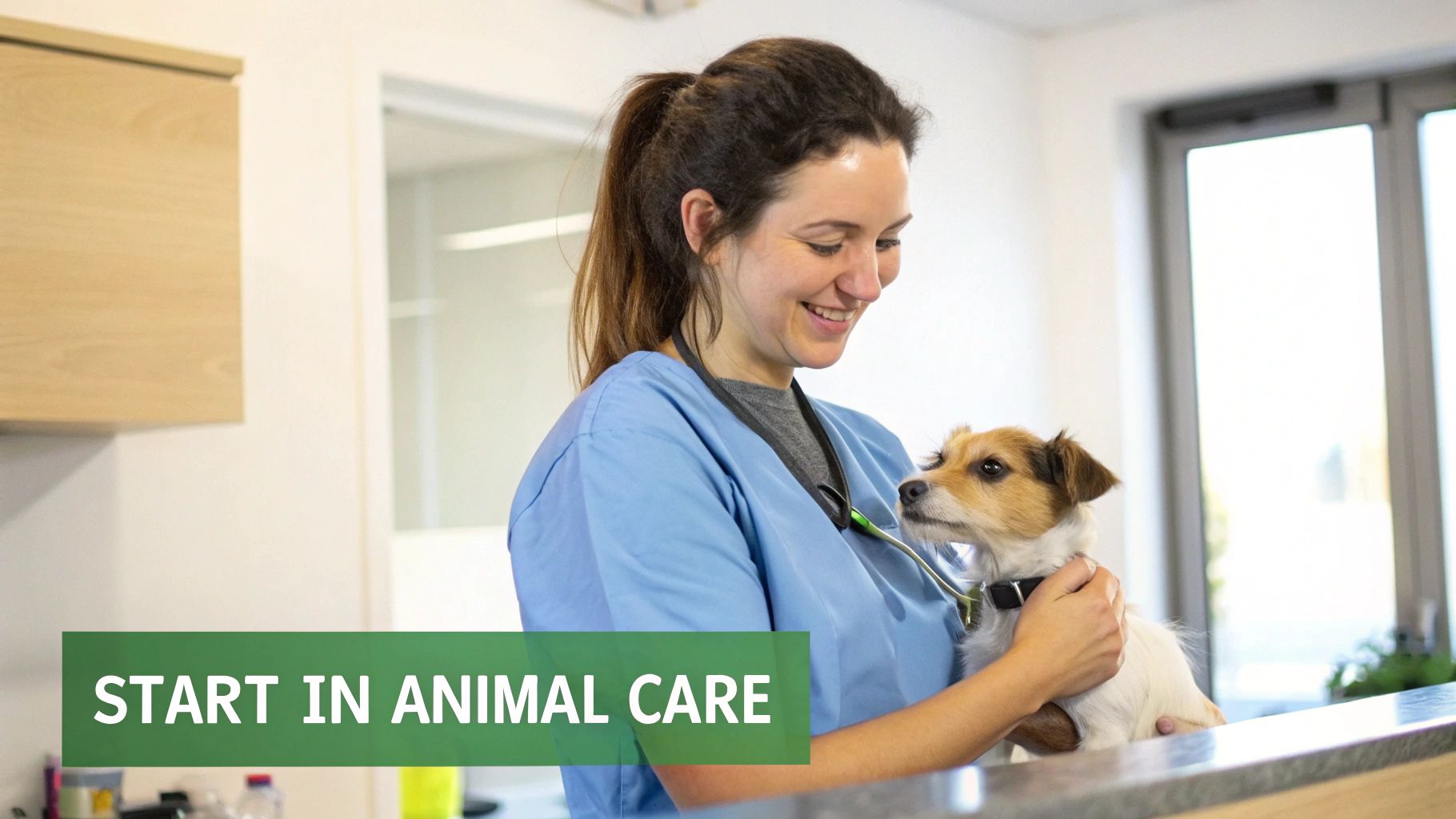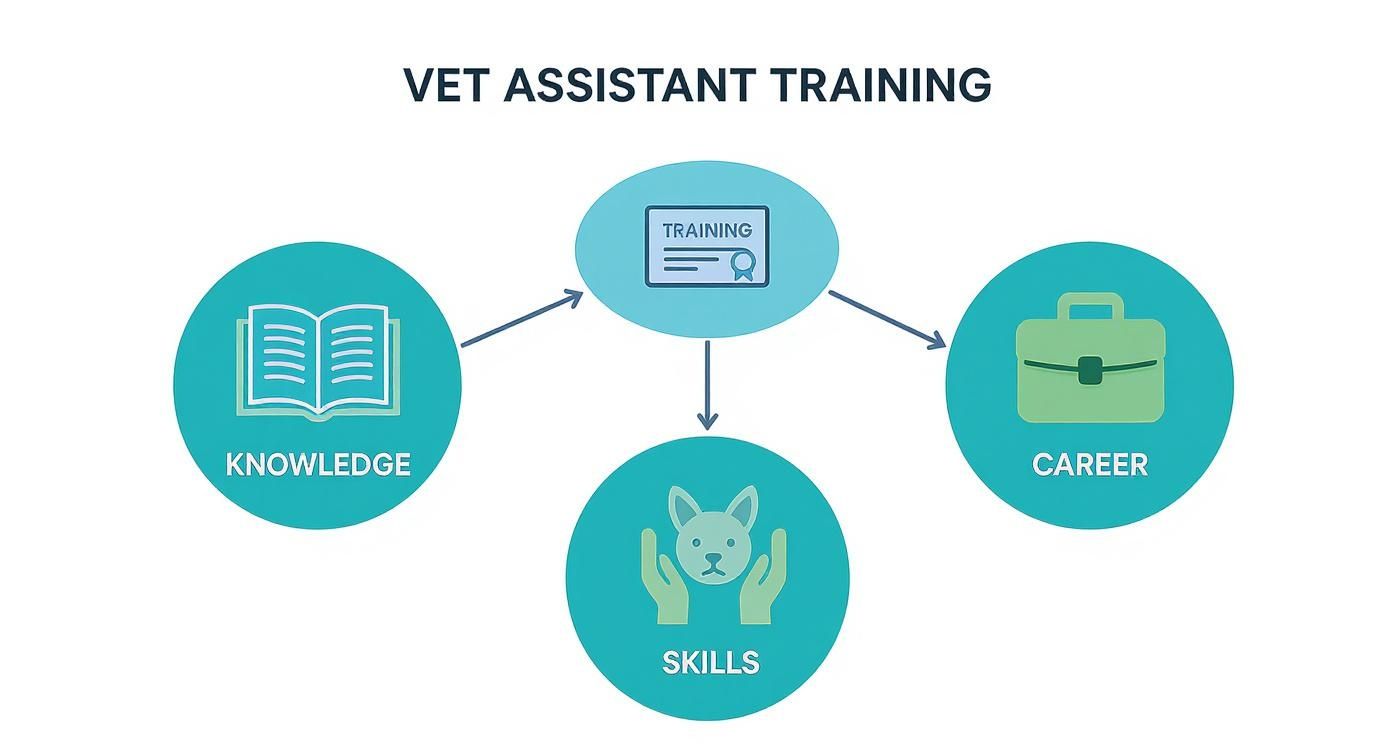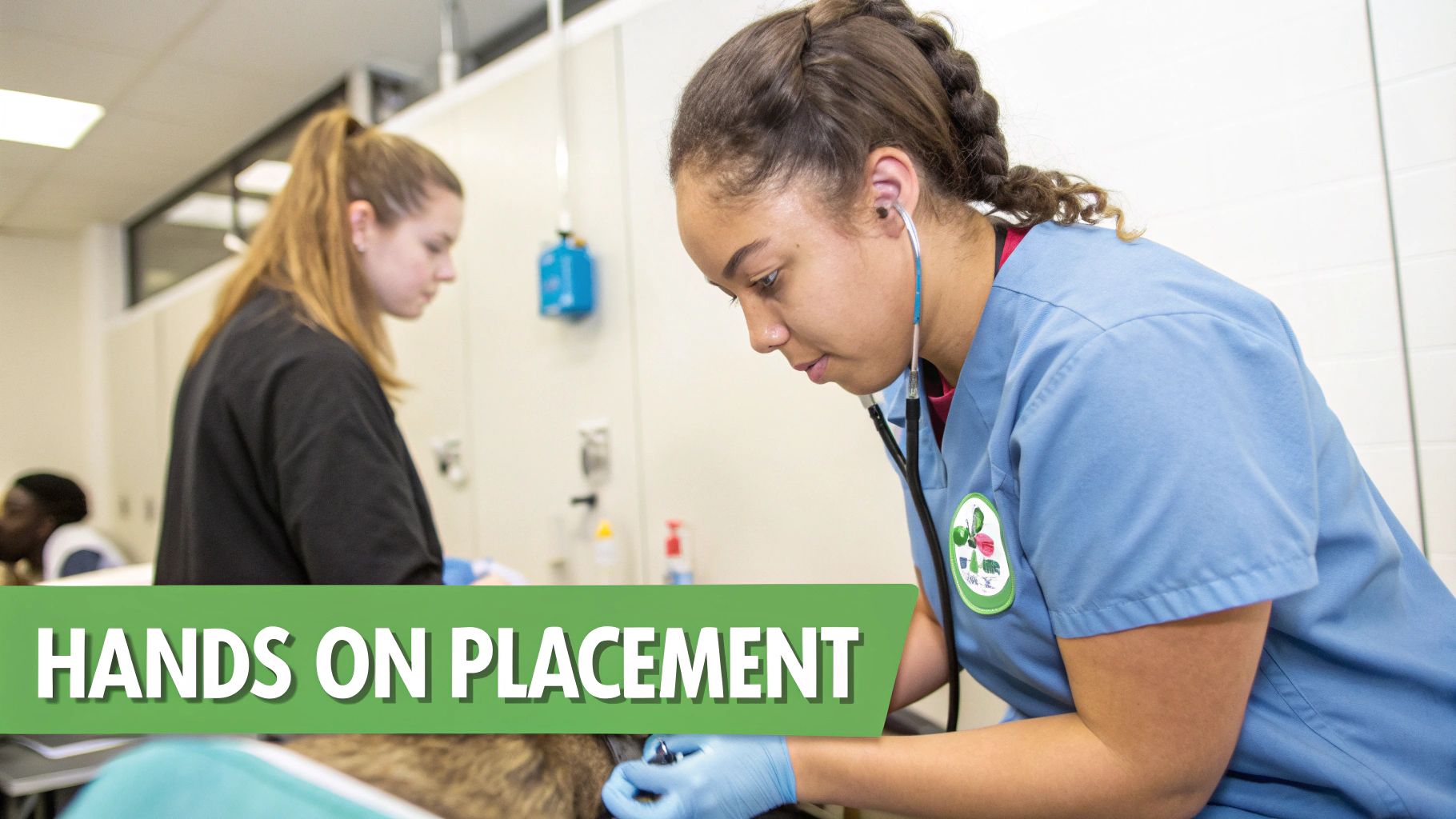
Have you ever wondered what it takes to turn your love for animals into a real, hands-on career? Becoming a Veterinary Nursing Assistant (VNA) could be your perfect first step. VNAs are the heart of any veterinary practice, providing essential support to vets and nurses and making a real difference in the lives of animals every single day.
But what does the training actually involve? This guide will walk you through everything you need to know about veterinary nurse assistant training, focusing on the skills you'll gain and what to expect from a recognised qualification like the online Level 2 Diploma for Veterinary Nursing Assistants (RQF) with Stonebridge Associated Colleges. Let's get started.

What Will You Learn in Veterinary Nurse Assistant Training?
Think of your training as the foundation for your entire career in animal care. It’s a structured journey designed to give you both the theoretical knowledge and the practical, real-world skills needed to be a valuable part of any clinic team from day one.
You’ll be learning to confidently support Registered Veterinary Nurses (RVNs) and veterinary surgeons in their daily work. This covers everything from animal health fundamentals and first aid to handling animals with the compassion and safety they deserve.
Why is a Formal Qualification So Important?
While a passion for animals is the perfect starting point, a formal qualification channels that passion into a professional career. In the UK, a respected qualification like the Level 2 Diploma for Veterinary Nursing Assistants will help you stand out against the competition for coveted supporting roles in veterinary practices. You can explore more about UK veterinary training pathways to see how these qualifications fit together.
This nationally recognised diploma from Stonebridge ensures you understand industry best practices, from animal first aid to professional conduct. It not only makes you a much more attractive candidate to employers but also lays a solid foundation for your future. Many use this as a stepping stone towards becoming a fully qualified RVN.
A Look Inside the Stonebridge Level 2 Diploma
So, what does a course like the Stonebridge Level 2 Diploma for Veterinary Nursing Assistants actually cover? It’s designed to be a comprehensive tour of everything that happens in a busy veterinary practice, broken down into clear, manageable units. You’ll build your skills step-by-step, developing both the technical ability and the empathy this career demands.

The curriculum is carefully balanced, giving you the theory you need while always connecting it back to what you'll actually be doing in a clinic.
Core Skills and Knowledge You'll Gain
Your training starts with the fundamentals of how a clinic operates before moving into more specialised animal care topics.
Foundational Units:
-
Administration in Veterinary Practice: Learn to manage appointments, handle client communication, and understand the administrative backbone of a practice.
-
Hygiene in Animal Care: Discover why spotless hygiene is non-negotiable for preventing infection and keeping animals safe. You'll cover cleaning protocols and waste disposal.
Animal Care Units:
-
Animal Health: Get confident with performing health checks, monitoring animals, and understanding common health issues and veterinary terms.
-
Animal Behaviour and Welfare: This is all about understanding why animals act the way they do, so you can handle and restrain them safely and with compassion.
-
Veterinary Medicines and Equipment: You’ll learn about different types of medicines, how to maintain equipment, and the correct procedures for ordering and disposal.
-
Wildlife in a Veterinary Practice: Get to know the common British wildlife species you might encounter and the organisations that can help.
Developing Practical, Compassionate Skills
Once you have the basics down, the course focuses on the hands-on and emotional skills you'll use every day.
-
Animal First Aid: This cornerstone unit gives you the confidence to act quickly and correctly in an emergency. You'll learn how to assess a situation, prioritise cases, and provide immediate care.
-
Pet Bereavement: This important module prepares you for one of the toughest parts of the job: supporting owners through the heartbreak of losing a pet. You'll learn about the stages of grief and find sensitive, professional ways to offer comfort.
This holistic approach ensures you become a truly versatile team member. You’ll be just as comfortable managing the front desk as you are assisting with a health check, making you an invaluable asset to any veterinary practice.
The Importance of Your Practical Placement
You can read all the textbooks you want, but veterinary nursing truly comes alive when you’re hands-on with animals. That’s why a practical placement is a mandatory and career-defining part of your training. It’s where everything you've learned clicks into place.
As a core requirement of the Stonebridge Level 2 Diploma, you’ll need to organise and complete a placement of at least two weeks. This must be at a registered Veterinary Practice or a similar organisation (like an animal charity or zoo) and supervised by a qualified Registered Veterinary Nurse (RVN). This is your chance to step out of the virtual classroom and into a real-world clinic.

Putting Theory into Practice
On your placement, you will get to apply all the knowledge you’ve been learning. You’ll practise handling animals with confidence, assist with real health checks, and see the day-to-day realities of the job up close. You might even get hands-on experience with tasks like learning comprehensive grooming techniques. It’s about building confidence, making professional contacts, and confirming that this is the career for you.
It’s this blend of solid theory and supervised practical work that keeps UK veterinary nursing standards high. The placement is non-negotiable for qualification, making sure you’re competent and ready to start work.
Finding a placement can take time, so it's a good idea to start your search as early as possible. If you need more guidance, you can read our article on what to expect from practical training. This dedicated time in a professional environment is what will transform you from a student into a capable Veterinary Nursing Assistant.
Why Choose Flexible Online Study?
Juggling life’s commitments can make starting a new career feel like an impossible puzzle. That’s exactly why flexible, online veterinary nurse assistant training has become such a popular choice. The Stonebridge Associated Colleges Level 2 Diploma is designed to be studied 100% online, putting you in control of your learning.
Imagine fitting your studies around your current job or family life. With online learning, you can study from home at your own pace, without a rigid college timetable. This self-paced approach makes a new career in animal care a realistic and achievable goal.
A Modern and Affordable Way to Learn
At Stonebridge, we believe high-quality education should be accessible. That's why we offer our courses through a simple, manageable monthly subscription. This straightforward payment model puts you in control of your learning and your finances, without the need for large upfront fees or long-term credit agreements.
What’s great about this is the freedom it gives you. You can pause or cancel your subscription whenever you need to. Your training fits around your life, not the other way around.
And you’re not on your own. As soon as you enrol, you're assigned a dedicated, qualified tutor who provides one-on-one support and constructive feedback on your assignments. If you’re curious, you can read more about the advantages of home study courses to see if it’s the right fit for you.
Key Benefits of the Stonebridge Subscription Model:
-
Financial Control: A predictable monthly payment makes budgeting easy.
-
Total Flexibility: Life happens. Pause your studies and pick them back up when you’re ready.
-
Immediate Start: No need to wait for term time. Enrol and start learning straight away.
Your Career Path After Qualification
Finishing your veterinary nurse assistant training is a fantastic achievement that opens up a world of opportunity. With a recognised Level 2 Diploma, you’ll be ready to step into a veterinary practice and start making a real difference.
But your journey doesn’t have to stop there. Think of this qualification as a powerful launchpad. Many graduates use it as a stepping stone to the Royal College of Veterinary Surgeons (RCVS) Level 3 Diploma in Veterinary Nursing, the qualification needed to become a Registered Veterinary Nurse (RVN).
Advancing to a Registered Veterinary Nurse
As an RVN, your role involves much greater responsibility, such as administering certain medications, performing minor surgical procedures, and taking a more direct role in patient care. Your Level 2 Diploma provides an alternative route to GCSEs, enhancing your opportunity to progress onto this higher qualification.
To get a better idea of the different roles available, you can explore our full guide on careers in veterinary care.
As you start your job search, getting your application right is key. It’s always a good idea to look at professional nursing CV examples to see how you can frame your new skills in the best possible light. Your Level 2 Diploma isn't just the end of your training; it's the beginning of a vibrant and fulfilling career.
Common Questions About Vet Assistant Training
Deciding to start a new career is a big step, and it's natural to have questions. Here are some of the most common queries about studying the Level 2 Diploma for Veterinary Nursing Assistants with Stonebridge.
What qualifications do I need to start?
One of the best things about this course is its accessibility. It is open to anyone aged 16 or over, and you don’t need any specific prior qualifications to enrol. All you need is a genuine passion for animal welfare.
How long does the training take?
On average, learners complete the course in 12 to 18 months. However, the beauty of online, self-paced learning is that you are in control. You can work through the modules as quickly or as steadily as your life allows, without the pressure of deadlines.
How is the course assessed?
Your progress is measured in a way that reflects the skills you’ll use in a real clinic. Assessment is a combination of:
-
End-of-unit assessments submitted online to your tutor for personalised feedback.
-
A portfolio of evidence documenting the hands-on skills you gain during your practical placement.
This blended approach ensures you not only understand the theory but can also apply it effectively in a real-world setting.
Is the Diploma a Recognised Qualification?
Yes, absolutely. The Level 2 Diploma for Veterinary Nursing Assistants is a nationally recognised qualification regulated by Ofqual. This means it meets high industry standards and is respected by employers across the UK. It is also a valid entry point for higher-level qualifications, like the Level 3 Diploma needed to become an RVN.
Ready to take the first step towards a rewarding career working with animals? At Stonebridge Associated Colleges, we provide flexible, recognised training that fits around your life. Enrol today and start your journey with our online Level 2 Diploma for Veterinary Nursing Assistants!




